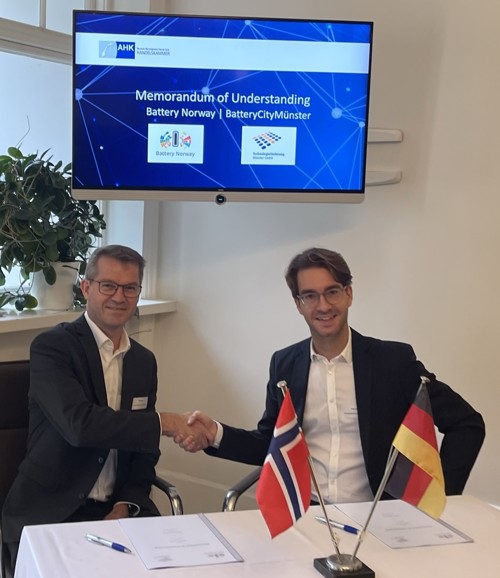Battery Norway signed an intent agreement with Germany
Battery Norway and Technologieförderung Münster GmbH (TFM) signed an intent agreement on Tuesday at the German-Norwegian office in Oslo, regarding collaboration in the battery value chain.
During the trip to Norway, the German delegation also visited Vianode, Glencore Nikkelverk AS, Morrow Batteries, University of Agder (UiA) and the Eyde Cluster.
Close collaboration
- Close collaboration with German players in batteries and the battery value chain is important for several reasons. With the significant changes brought about by electrification and the green transition for both countries, cooperation is more crucial than ever. I would especially like to mention the German automotive industry and the shift to battery-powered cars that Germany is currently in the midst of, says Pål Runde, the leader of Battery Norway.
He believes that Norway and Germany both have much to gain from close collaboration in areas such as production technology, battery chemistry, and battery recycling.
A natural step
- Raw materials and the further processing of these into battery materials are also important areas for cooperation. Moreover, Germany is a country where we have a long and successful history of collaboration in research and innovation, for example, through EU programs, says Runde.
For Battery Norway, intent agreements like this are a natural step in following up on the Norwegian-German partnership that was launched earlier this year, where raw materials and batteries were identified as a distinct area.
- When it comes to specific collaboration projects, it's important that these are initiated and driven by the industry and companies, Runde adds.
HVA SKJER
Se hele kalenderen >-
ARENDALSUKA: Prosessindustrien: Norges bidrag til Europas sikkerhet!
Vitensenteret (VitenUstillingen) -
ARENDALSUKA: Get-together i regi av NEW Node Eyde Women
Kystveien 2. 4841 Arendal, terrassen i 4.etg (Eyde-klyngens lokaler) -
ARENDALSUKA - Global Outlook 2025
Arendal kulturhus, Store Torungen -
ARENDALSUKA: Batterier – Beredskap og bærekraft i en urolig tid
Vitensenteret (VitenUstillingen) -
Arendalsuka: Industrimingling med Prosess21
VitenUtsillingen, Kystveien 2



